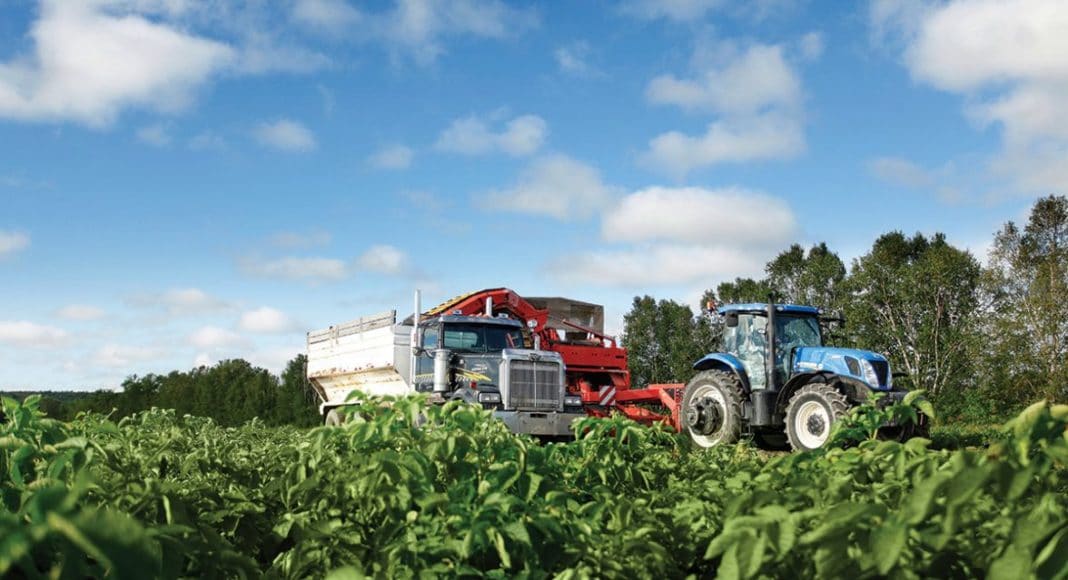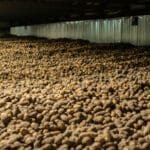[deck]Ontario’s Valley Growers celebrates first year on market with unique french fry product with award-winning recognition.[/deck]
2015 was a whirlwind year for Valley Growers, the Ontario potato company operated by Gerry Philippe and Tami Rainville. Its line of never frozen packaged french fries called G&T Farmhouse Fresh Fries was launched in the spring of last year. After months of strong market acceptance that continues to grow by the day, the makers of Farmhouse Fresh Fries received a prestigious Ontario Premier’s Award for Agri-Food Innovation Excellence in November.
The story of Farmhouse Fresh Fries actually began decades ago on the Rainville family farm in the fertile Blezard Valley near Sudbury, Ont. Potatoes have always grown there, going back five generations.
In the early 1980s, Roland Rainville bought the Valley Growers business and its land from another nearby farmer, but the original Rainville farm remains part of the total farm business acreage. In 2010 he retired and sold Valley Growers to his daughter Tami and co-owner Philippe, who’d spent summers working on the farm in his youth and kept in touch with Roland afterwards.
Valley Growers currently has a cultivation area of 1,500 acres, with more than seven million kilograms of Russet potatoes grown annually on about a third of that in a three-year rotation. “In non-potato years, we grow winter wheat and sometimes oat, barley, sometimes clover,” says Philippe. “We base it on what’s best for the potatoes down the road.”
The idea for producing fresh french fries was something Rainville and Philippe decided to do soon after they bought Valley Growers. It wasn’t long afterwards that they took the plunge and built an on-farm processing plant to make them.
“Although the farm is self-sustaining,” Philippe says, “we felt that adding a value-added product would add jobs, provide a high-quality natural product for consumers and also grow the business.”
However, the never frozen product they were making used sulphates as a preservative and only had a nine-day shelf life. That’s why, in 2013, they decided to go a different route to create fresh fries that not only were preservative-free but also lasted longer.
“Steve Crawford, who works at Gordon Food Service and is a friend of mine, said, ‘Why don’t you make a natural product? If you pre-cook them in oil, and give them a longer shelf life, I can sell these’,” says Philippe.
He and Rainville talked about it and decided to do just that. They took a hard look and saw there was a gap in the market in terms of available fresh and natural products.
According to Philippe, frozen french fries typically contain preservatives as well as flavour-enhancing additives. “Our fries have potatoes and canola oil, two ingredients,” he says.
The product development began and plans for a new plant nailed down. They brought in a consultant with a lot of frying experience and a plant designer and builder. A year and a half later, the new product was ready to sell and the number of employees on the farm had climbed to over 40.
According to Philippe, the process is simple: the potatoes are cut, blanched briefly in a fryer so they’re partially cooked, and then cooled and packaged in a pouch, staying fresh for 25 days.
“To date, we supply the potatoes ourselves 100 per cent, so our product is also fully traceable back to our farm,” Philippe says, adding that G&T Farmhouse Fresh Fries are comparable in price to frozen french fries. Valley Growers still sells fresh market potatoes, mostly to Loblaws supermarkets. “Loblaws is a great partner,” says Philippe.
We felt that adding a value-added product would add jobs, provide a high-quality natural product for consumers and also grow the business.
– Gerry Philippe
Positive Response
Farmhouse Fresh Fries are currently sold mainly to food service companies and restaurants. Philippe explains that a lot of restaurant owners cut their own fries, but that’s very labour-intensive so many are happy to have a high-quality alternative.
According to Philippe, customer response to Valley Growers’ fresh fries has been remarkable. “It’s crazy, how positive it’s been,” he explains. “Here’s an example. I went into a restaurant in early December and the owner is known as being very critical. I was prewarned that this guy is very hard to please. He makes his own fries. When he tried our product, he hesitated and then said he could pass these off as his own. That response is very typical. It happens all the time.”
Pete Barbeau, owner of Sudbury’s M.I.C. Canadian Eatery & Whisky Pub (M.I.C. is short for Made in Canada), says he started using G&T Farmhouse Fresh Fries as soon they were available.
“We’d used his fresh product before but they weren’t blanched,” he notes. “I love the new product. It’s a lot easier on the oil and as far as labour goes, we used to spend an hour blanching fries, and we don’t have to do that anymore. And the flavour is awesome.”
Valley Growers currently supplies Farmhouse Fresh Fries to Gordon Food Service (which serves McMaster University and the University of Waterloo in Ontario), and Philippe is hopeful of receiving orders from more food service companies. He says tests are also in the works with a major restaurant chain, and if that goes well, the product will be served through all 68 of the chain’s outlets. Valley Growers is also working on adding Costco to its list of retail customers.

In terms of generating new sales, Philippe notes “education is the biggest thing.” Samples sometimes end up in the freezer because customers think french fry products need to be frozen, he says, “so we remind people that refrigeration is all they need.”
Philipppe says the 21-day shelf life of Farmhouse Fresh Fries is more than enough for restaurants and food service firms, which use up their supplies on a weekly basis, However, the company now have a food scientist working to extend the shelf life to 40 days “just because it gives us a little more room for shipping the product across the country,” Philippe says.
“There are a few factors involved in extending the shelf life, but the process will essentially remain the same.”
Philippe notes it was great to be recognized with the agri-food innovation excellence award from the Ontario government. “It acknowledges and validates the process,” he says.
Philippe describes his and Rainville’s experience with Farmhouse Fresh Fries, like that of most entrepreneurs bringing a new product to market, as quite the rollercoaster ride.
“It was frightening to build the plant,” he says. “Even with a building and half the equipment from the processing we already were doing, it was a huge investment.” In due time, Philippe and Rainville plan to make fresh diced breakfast home fries, and will invest in additional machinery then.

As to what he’d say to any farmer considering a value-added venture, Philippe advises doing your research and surrounding yourself with the right people who have experience in what you are aiming to do.
“Take your budget and double it because things are going to cost twice as much,” he says. “In terms of what I would change, I would say nothing because there are going to be bumps in the road, but you learn from them. You just have to have your eye on the long-term target and you’ll get there.”
WHERE ON THE WEB
For more information on Valley Growers’ G&T Farmhouse Fresh Fries, visit farmhousefries.com.











